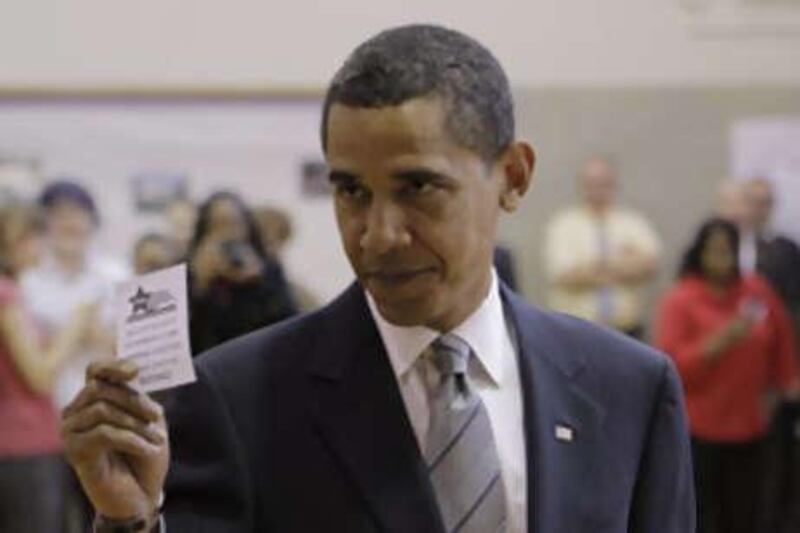CHICAGO // As many as 130 million Americans were expected to have cast ballots by day's end on Tuesday in a historic and hard-fought race for the White House that will see either a black man as president or a woman as vice president for the first time in the country's history. Barack Obama, who was scheduled to watch election-night returns here in his hometown of Chicago, and John McCain, who planned to be in Phoenix, both ran hard and fast across the campaign finish line, reminding voters of the importance of every last ballot.
Locked in a historic race, Mr Obama and Mr McCain each spent millions of dollars on get-out-the-vote efforts in the final days of the race and enlisted tens of thousands of volunteers to make phone calls and knock on doors. Mr Obama headed into election day with a distinct edge in national polls, and key statewide ones, after a campaign in which he eclipsed fund-raising records and employed a strategy largely unfamiliar to Democrats who came before him: campaigning on traditionally Republican turf.
"Their strategy was to change the face of the electoral map," said Traci Burch, an assistant professor of political science at Northwestern University in Illinois who studies the US presidency. With some states expecting 80 per cent or more of registered voters to cast ballots, political analysts were predicting possible record turnout nationwide - or at least the most robust turnout in decades. In 2004, about 122 million US citizens voted, representing 55 per cent of the voting-age population, according to federal data. Even with most public opinion surveys pointing to an Obama victory, pollsters said pre-election surveys could prove wrong because of a number of unprecedented factors in this year's campaign. One among them: whether young voters, who historically have not shown up in large numbers, would do so this year, as the Obama camp had hoped. "That's one big unknown, and an unprecedented unknown," said Peter Miller, editor of Public Opinion Quarterly, a scholarly journal. "The pollsters don't have a benchmark for that. [And] they obviously don't have a benchmark for an African-American running for president." Much has been made of the so-called "Bradley Effect", a theory holding that a black candidate may have less support than polls indicate because some white voters tell pollsters they will vote for the black candidate when, in the end, they will not. But Mr Miller said he doubted it would be a deciding factor. "I personally would be very, very surprised if the Bradley Effect made [such] a difference this year that it would turn over the results of the polls in favour of McCain." Critical battleground states included Florida and Ohio, which have 27 and 20 electoral votes, respectively, and which went Republican four years ago; and Pennsylvania, which has 21 electoral votes and which voted Democrat in 2004. Other states critical to both tickets were Colorado, Indiana, Missouri, Nevada and North Carolina. Presidential candidates need 270 electoral votes to win - each state is allotted electoral votes based in part on its population - so candidates must wage a state-by-state battle. Mr Obama seemed, in the final days of the race, to have more paths to that number than Mr McCain. Thousands of lawyers - hired by both parties, voting-rights groups and special-interest organisations - fanned out across the country to monitor the voting, prepared to step in in the case of legal challenges over disputed ballots. Election analysts said the record turnouts, long queues and an unprecedented number of newly registered voters could create ripe conditions for disputes. The contest had already seen its share of litigation and partisan meddling: Republicans accused Democrats last month of engaging in widespread voter registration fraud; Democrats sued Republicans in some key states, alleging voter intimidation. Before election day, dozens of civil suits were pending, including in Florida, Indiana, Ohio and -Pennsylvania. The residents of the tiny town of Dixville Notch in New Hampshire, population 75, who traditionally cast the country's first ballots beginning at 12am Tuesday, local time, did so again this year. Mr Obama got 15 votes, and Mr McCain got 6 - the first time Dixville Notch has gone Democratic since 1968. This year's presidential contest - which marks the first time since 1952 that an incumbent president or vice president has not been on the ticket - has been the longest and most expensive in history. eniedowski@thenational.ae * With additional reporting by Steven Stanek






